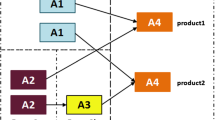Abstract
This paper deals with an application of constraint programming in production scheduling with earliness and tardiness penalties that reflects the scheduling part of the Just-In-Time inventory strategy. Two scheduling problems are studied, an industrial case study problem of lacquer production scheduling, and also the job-shop scheduling problem with earliness/tardiness costs. The paper presents two algorithms that help the constraint programming solver to find solutions of these complex problems. The first algorithm, called the cost directed initialization, performs a greedy initialization of the search tree. The second one, called the time reversing transformation and designed for lacquer production scheduling, reformulates the problem to be more easily searchable when the default search or the cost directed initialization is used. The conducted experiments, using case study instances and randomly generated problem instances, show that our algorithms outperform generic approaches, and on average give better results than other nontrivial algorithms.
Similar content being viewed by others
References
AMETIST (2002). European Community Project IST-2001-35304. Advanced methods for timed systems. http://ametist.cs.utwente.nl/.
Baker K. R., Scudder G. D. (1990) Sequencing with earliness and tardiness penalties: A review. Operations Research 38(1): 22–36
Baptiste, P., Le Pape, C., & Nuijten, W. (1995). Constraint-based optimization and approximation for job-shop scheduling. In: AAAI-SIGMAN Workshop, IJCAI-95.
Barták, R., Salido, M. A., & Rossi, F. (2009). Constraint satisfaction techniques in planning and scheduling. Journal of Intelligent Manufacturing. doi:10.1007/s10845-008-0203-4.
Beck, J. C., & Perron, L. (2000). Discrepancy-bounded depth first search. In: CP-AI-OR 2000.
Beck, J. C., & Refalo, P. (2002). Combining local search and linear programming to solve earliness/tardiness scheduling problems. In: CP-AI-OR 2002.
Beck J. C., Refalo P. (2003) A hybrid approach to scheduling with earliness and tardiness costs. Annals of Operations Research 118(1–4): 49–71
Behrmann, G., Brinksma, E., Hendriks, M., & Mader, A. (2005). Production scheduling by reachability analysis—a case study. In: WPDRTS 2005. IEEE Computer Society Press.
Blazewicz J., Ecker K. H., Pesch E., Schmidt G., Werglarz J. (2001) Scheduling computer and manufacturing processes (2nd ed.). Springer-Verlag, Berlin
Carlier J., Pinson E. (1990) A practical use of jackson’s pre-emptive schedule for solving the job-shop problem. Annals of Operations Research 26: 269–287
Danna, E., & Perron, L. (2003). Structured vs. unstructured large neighborhood search: A case study on job-shop scheduling problems with earliness and tardiness costs. In: CP 2003. pp. 817–821.
Danna E., Rothberg E., Le Pape C. (2005) Exploring relaxation induced neighborhoods to improve MIP solution. Mathematical Programming 102(1): 71–90
Du J., Leung J. Y.-T. (1990) Minimizing total tardiness on one machine is NP-hard. Mathematics of Operations Research 15(3): 483–495
El Sakkout H., Wallace M. (2000) Probe backtrack search for minimal perturbation in dynamic scheduling. Constraints 5(4): 359–388
Harvey, W. D., & Ginsberg, M. L. (1995). Limited discrepancy search. In: IJCAI-95. pp. 607–615.
Hoogeveen H. (2005) Multicriteria scheduling. European Journal of Operations Research 167(3): 592–623
ILOG (2002). Ilog OPL Studio 3.6 Language Manual.
ILOG (2005). Ilog Cplex 9.1 User’s Manual.
Laborie P. (2003) Algorithm for propagating resource constraints in AI planning and scheduling: Existing approaches and new results. Artificial Intelligence 143(2): 151–188
Loeschmann, S., Ludewig, D. (2003). Case study 4: Detailed description of the problem—model of a lacquer production. AMETIST Deliverable 3.4.1.
Luh P. B. et al (1998) Job shop scheduling with group-dependent setups, finite buffers, and long time horizon. Annals of Operations Research 78: 233–259
Mercier L., Van Hentenryck P. (2008) Edge finding for cumulative scheduling. Informs Journal on Computing 20(1): 143–153
Nuijten W., Aarts E. (1996) A computational study of constraint satisfaction for multiple capacitated job shop scheduling. European Journal of Operational Research 90(2): 269–284
Ohno T. (1988) Toyota production system: Beyond large-scale production. Productivity Press, New York
Taillard E. (1993) Benchmarks for basic scheduling problems. European Journal of Operational Research 64: 278–285
Author information
Authors and Affiliations
Corresponding author
Rights and permissions
About this article
Cite this article
Kelbel, J., Hanzálek, Z. Solving production scheduling with earliness/tardiness penalties by constraint programming. J Intell Manuf 22, 553–562 (2011). https://doi.org/10.1007/s10845-009-0318-2
Received:
Accepted:
Published:
Issue Date:
DOI: https://doi.org/10.1007/s10845-009-0318-2




